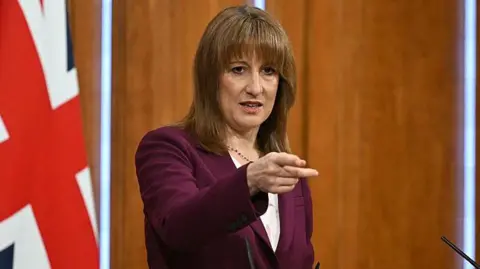Reeves lays ground for painful Budget, but will it be worth it?
6 hours agoDharshini DavidDeputy economics editor

 Getty Images
Getty ImagesThe chancellor’s pitch: the Budget will be painful, due to the actions of others, but it will be worth it, to tackle debt, help public services and promote growth.
How does that add up?
Rachel Reeves pinned the need for expected tax rises on the actions of previous governments – post-Brexit trading arrangements, austerity – as the underlying reasons for a disappointing assessment by the official forecasters of the economy’s productivity.
That productivity has been held back by years of poor investment, and improvements have been slow. Lower productivity means weaker growth in the economy, hitting tax income and affecting assumptions about how much money the chancellor has to find to meet her financial rules.
Reeves also pointed to other external forces – tariffs and supply chain disruption – for the underwhelming performance of growth and inflation.
But some of these were foreseeable. Even if the official assessment is worse than thought, productivity – a measure of the output of the economy per hour worked – has long been problematic.
And when it comes to external factors, President Trump’s trade hostilities, for example, are expected to have a very limited impact on growth.
Economists say the chancellor may need tax rises totalling some £30bn to meet her financial rules by a comfortable margin.
Reeves accused past Conservative governments of prioritising political convenience, but her fiscal position also reflects similar actions by her own government.
The public purse is having to find several billions of pounds to fund U-turns over welfare and Winter Fuel Payments.
Analysts, including those at the Bank of England, also point to the chancellor’s own tax rises in last year’s Budget as hindering growth and employment, and adding to inflation pressures this year.
It was always risky for Reeves to suggest she wouldn’t be back for another hefty tax raid. She met her financial rules by only a slim margin last year. The gamble didn’t pay off, but it can’t just be blamed on ill winds from elsewhere.
It now appears that taxes are going to rise – and significantly. The chancellor argues money is needed to support the extra funding that has been put into public services, but the performance of these services depends on more than just cash.
Official figures indicate that in the year after Labour came to power, the public sector, and in particular healthcare, became less efficient as productivity dropped. There’s more work to be done if we’re to get bang for our buck.
For the actual detail on which taxes will rise, we’ll have to wait until the Budget.
But by skirting around the issue of whether manifesto pledges will be adhered to, while claiming to have inherited a dire environment, the chancellor has stoked speculation that income tax rates may rise.
The pledges of not increasing the main rates of VAT, employee National Insurance Contributions and income tax always seemed risky to economists – the “big three” account for the majority of tax take. But they are also the most visible taxes for the public, and their inclusion in the manifesto made them appear taboo, glass only to be broken in cases of emergency.
A rise in, say, income tax rates may come to pass (perhaps accompanied with a cut in National Insurance to offset the impact on workers). But it may not.
The Budget is still being put together. The door to breaking manifesto pledges may have been deliberately nudged open so that if it doesn’t come to pass, then an alternate package of tax rises, however large, would be greeted with relief.
There are a multitude of other options to consider– a levy on banks or the gambling industry, a further freezing of the thresholds at which different rates of taxes on incomes become applicable (so-called fiscal drag), a change in the liability of partnerships for National Insurance and even the tax treatment of pension levies have all been mooted.
And those tax rises will still be substantial, and felt primarily in the pockets of the better off.
Finding tax rises of the tune of £20-£30bn – sucking that amount out of the economy – is impossible without affecting incomes or profits, which risks damaging the outlook for growth.
However big the tax bill, this Budget may not deliver everything the chancellor wishes for.